Yin deficiency is caused by a deficiency of vital fluids such as body fluids, essence, and blood, leading to insufficient Yin in the body. This results in a diminished ability to nourish and control yang heat, causing the imbalance of Yin and Yang, which manifests as dryness, heat, and other symptoms.
In Chinese Tongue Diagnosis, Yin deficiency often appears as a red tongue with little or thin coating, and the tongue may show cracks, indicating severe Yin fluid deficiency in the body. The tongue appearance is a crucial tool for diagnosing this condition.
1. What Are the Symptoms of Yin Deficiency?
Yin deficiency leads to a lack of body fluids, causing the body to lose the necessary moisture and nourishment. Through Chinese Tongue Diagnosis, one can observe that a person with Yin deficiency may have a red tongue, a thin or absent coating, and the tongue may appear dry or cracked. The main symptoms of Yin deficiency include weight loss, a flushed complexion, constant dry mouth and throat, a persistent thirst with a preference for cold drinks, frequent heat signs, and recurring mouth ulcers.
2. How Should People with Yin Deficiency Regulate Their Condition?
Since Yin deficiency is mainly due to a lack of body fluids, the main approach for regulation should focus on nourishing Yin and clearing heat. Chinese Tongue Diagnosis helps assess the severity of Yin deficiency and guides the formulation of personalized treatment plans. Adjustments can be made through diet, herbal remedies, exercise, and acupuncture.
- Dietary Adjustments: Consume foods that nourish Yin and generate fluids. People with Yin deficiency should focus on a diet that nourishes Yin, clears heat, and strengthens the liver and kidneys. Ideal foods include those that are cool, moistening, rich in dietary fiber, and vitamins. Foods like pears, bananas, and snow fungus (yín ěr, 银耳) are excellent choices. Avoid spicy, fried, or fatty foods, as well as foods high in sugar, which can exacerbate the symptoms.
- Herbal Remedies: Use Yin-nourishing and moisture-restoring herbs. To address Yin deficiency, herbs like Sha Shen (沙参), Bai He (百合), Mai Dong (麦冬), Tian Dong (天冬), Goji Berries (枸杞子), and Wu Wei Zi (五味子) can be used. These herbs can be brewed into medicinal teas or tonics to help alleviate the symptoms of Yin deficiency.
- Exercise: Gentle exercises are recommended. People with Yin deficiency should avoid intense physical activity and instead focus on lighter exercises, such as Tai Chi, yoga, or walking. The goal is to exercise at a moderate intensity, allowing for a light sweat to help relax the body and improve overall health.
- Acupuncture and Gua Sha: Yin-nourishing and heat-clearing treatments. To relieve Yin deficiency, acupressure and Gua Sha are commonly used. Gua Sha should first be performed on the body for 3-5 minutes to clear the meridians, followed by 5 minutes of Gua Sha to clear heat. This can enhance the body’s ability to produce fluids. Massaging points such as Ran Gu (然谷) can help calm excessive internal heat. The Tai Chong (太冲) and Xing Jian (行间) points nourish the liver Yin, while San Yin Jiao (三阴交) nourishes Yin and blood. Gua Sha along the Shen Jing (肾经) can harmonize the Yin and Yang of the kidneys.
Dietary Caution: Spicy foods can exacerbate symptoms. Spicy foods such as chili peppers, ginger, and garlic can generate internal heat and damage Yin fluids, leading to an imbalance of Yin and Yang. This is especially problematic in dry northern climates. Moreover, spicy foods are generally not conducive to nourishing Yin, so people with Yin deficiency should limit their intake.
Yin deficiency can also cause dryness and discomfort in the eyes. To help alleviate this, it’s important to reduce eye strain. After 40 minutes to an hour of looking at screens, take breaks by looking at distant objects or performing eye exercises to relieve dryness.
3. Daily Life and Lifestyle Adjustments
In addition to avoiding excessive eye strain and staying up late, those with Yin deficiency should also pay attention to their daily routine and living environment.
- Coffee Avoidance: Coffee, especially medium-to-deeply roasted beans, is considered to have a heating nature. Therefore, those with Yin deficiency should limit their coffee consumption. Regular consumption of coffee can increase internal heat, causing symptoms like dry mouth and constipation.
- Thirst: Thirst is one of the most common symptoms of Yin deficiency. However, the deficiency is not caused by a lack of water intake, so simply drinking more water won’t resolve the issue. Instead, comprehensive treatment from diet, lifestyle, and exercise is needed to restore Yin.
- Emotional Well-being: Those with Yin deficiency may experience irritability and mood swings, often due to liver or lung Yin deficiency. Whether nourishing the liver or the lungs, it is essential to maintain a calm and peaceful mind. Avoid constant worry or sadness, as emotional health plays a significant role in maintaining balance.
Table of Contents
一. Cracked Tongue with Dry Coating – Wind-Yang Damaging Yin
In Chinese Tongue Diagnosis, when the tongue shows noticeable cracks, is red in color, with a yellowish, slightly thick, and dry coating, it typically indicates Yin deficiency. This pattern is often caused by wind-phlegm disturbing the body, which has been lurking within for a prolonged period, damaging the Yin fluids. This leads to a deficiency of body fluids that cannot nourish the tongue, eventually causing the tongue to crack and dry out.
1. Pathological Tongue Signs and Other Symptoms
Patients with this tongue appearance often experience dizziness, a heavy feeling in the head, and stiffness or discomfort in the shoulders and arms. There may also be symptoms like dry mouth and weight loss. In severe cases, due to excessive wind-yang, it could lead to conditions like a stroke. Chinese Tongue Diagnosis plays an important role in diagnosing these symptoms, helping to further clarify the presence of Yin deficiency and its associated wind-yang symptoms.
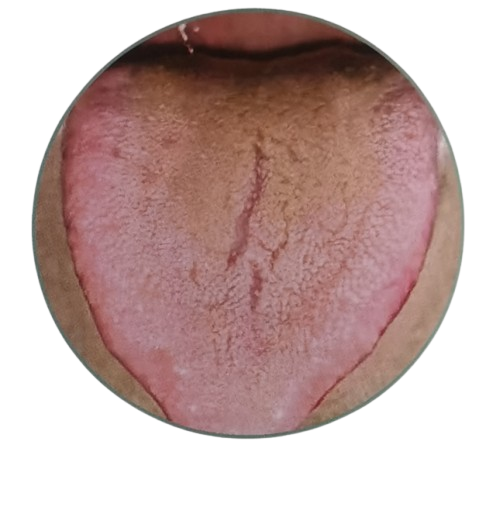
(Image) Cracked tongue, yellow and dry coating.
2. How to Regulate
This tongue sign is commonly seen in cases where wind-phlegm disturbs the body and damages Yin. The main therapeutic principles should focus on calming the liver and subduing wind, resolving phlegm, and generating fluids to restore the Yin and moisturize the body.
- Daily Maintenance: Frequently staying up late or overworking depletes the Yin fluids, leading to symptoms like dry eyes, thirst, and a bitter taste in the mouth. People with Yin deficiency should maintain a regular sleep schedule, ensuring adequate rest to avoid further damage to Yin.
- Dietary Therapy: People with Yin deficiency should consume cold, moistening foods that nourish the liver and kidneys, such as pork (猪肉), sea cucumber (海参), walnuts (核桃), and goji berries (枸杞子). They should avoid consuming warming, drying, or spicy foods. Dietary regulation can help improve Yin deficiency and address tongue symptoms.
- Herbal Medicine: It is advisable to use herbs that calm the liver and subdue wind, such as Chrysanthemum (菊花) and Antelope Horn (羚羊角), combined with Gualou (瓜蒌) and Mai Dong (麦冬). Chrysanthemum and Antelope Horn help calm the liver and subdue wind, while Gualou and Mai Dong help clear heat, generate fluids, and nourish Yin, addressing the dryness associated with Yin deficiency.
- Acupressure: Under the guidance of Chinese Tongue Diagnosis, acupressure can target points like Feng Chi (风池) and Gan Shu (肝俞) for Gua Sha (scraping therapy) to calm the liver and subdue wind. Points like Feng Long (丰隆) and Shan Zhong (膻中) can be massaged to resolve phlegm and promote fluid production, further regulating Yin deficiency.
二. Thin Red Tongue with Scattered Coating – Liver and Kidney Yin Deficiency
According to Chinese Tongue Diagnosis, when the tongue appears thin, shriveled, and very thin with a red color and the coating is scattered, it indicates Yin deficiency, particularly of the liver and kidneys. This tongue sign suggests malnutrition and Qi-blood deficiency. The red tongue indicates that Yin fluids are insufficient and unable to nourish and hydrate the tongue, resulting in a dry and thin tongue.
1. Pathological Tongue Signs and Other Symptoms
This tongue appearance is commonly associated with Liver and Kidney Yin deficiency and the accumulation of toxins in the body. Patients often experience symptoms such as dizziness, dry eyes, fatigue, numbness in limbs, dry mouth and throat, insomnia with vivid dreams, pain in the hypochondrium (side of the body), nocturnal emissions in men, and scanty menstruation in women. Chinese Tongue Diagnosis can help identify Liver and Kidney Yin deficiency and formulate appropriate treatment methods, especially when the tongue appears thin and red, which strongly indicates Yin deficiency.
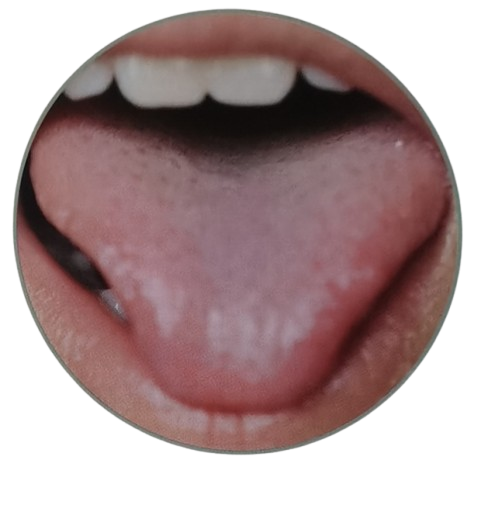
(Image) Thin coating on the tongue, red tongue body.
2. How to Regulate
This tongue sign indicates that the primary issue is Liver and Kidney Yin deficiency. Treatment should focus on clearing heat, nourishing Yin, detoxifying, and resolving blood stasis. Approaches may include dietary therapy, herbal medicine, and acupressure to restore Yin fluids, nourish the liver and kidneys, and alleviate the symptoms of Yin deficiency.
- Daily Maintenance: Regularly stimulating the ears, such as pulling the earlobes or massaging the ears, can help open the meridians, promote the smooth flow of Qi and blood, and enhance immunity. People with Yin deficiency should especially focus on such activities, as opening the meridians helps relieve symptoms.
- Dietary Therapy: People with Yin deficiency should consume foods that nourish the liver and kidneys, such as lamb bones (羊骨), animal liver and kidneys, black sesame seeds (黑芝麻), black beans (黑豆), Chinese yam (山药), and goji berries (枸杞子). They should also avoid alcohol and spicy foods. By monitoring dietary changes, Chinese Tongue Diagnosis can effectively assess the recovery process of Yin deficiency and allow for timely adjustments in the diet plan.
- Herbal Medicine: It is advisable to use herbs that nourish the liver and kidneys. People with Liver and Kidney Yin deficiency can select classic formulas like Qi Ju Di Huang Wan (杞菊地黄丸) or Zuo Gui Yin (左归饮). These formulas effectively nourish liver and kidney Yin, alleviating tongue symptoms and improving overall health.
- Acupressure: Points such as San Yin Jiao (三阴交), Shen Shu (肾俞), Guan Yuan (关元), and Zhong Ji (中极) can be massaged to nourish the liver and kidneys, invigorate blood circulation, and resolve blood stasis. This targeted acupressure, combined with Chinese Tongue Diagnosis, can provide precise treatment to restore Yin fluids and improve the tongue appearance.
三. Bright Red Tongue with Little Coating – Yin Deficiency and Excessive Fire
According to Chinese Tongue Diagnosis, when the tongue appears bright red, with little coating or no coating on the tip, and the tongue body is thin with petechiae (small red spots), it indicates Yin deficiency with excessive internal heat. In Yin-deficient individuals, the blood flows too quickly under the influence of internal heat, leading to an overflowing of Qi and blood, which causes the tongue body to become filled and the tongue color to turn bright red. Prolonged internal heat depletes Yin fluids, causing the tongue to become thin and dry. This is a typical tongue sign of Yin deficiency with excessive fire.
1. Pathological Tongue Signs and Other Symptoms
This tongue appearance is typically due to Kidney Yin deficiency, which prevents Yin fluids from nourishing the heart, leading to excessive heart fire. Patients commonly experience symptoms such as palpitations, irritability, insomnia, dizziness, tinnitus, dry mouth, and a dry tongue. Chinese Tongue Diagnosis can directly identify the tongue sign of excessive fire due to Yin deficiency, helping to quickly understand the patient’s physical condition and provide a basis for treatment.
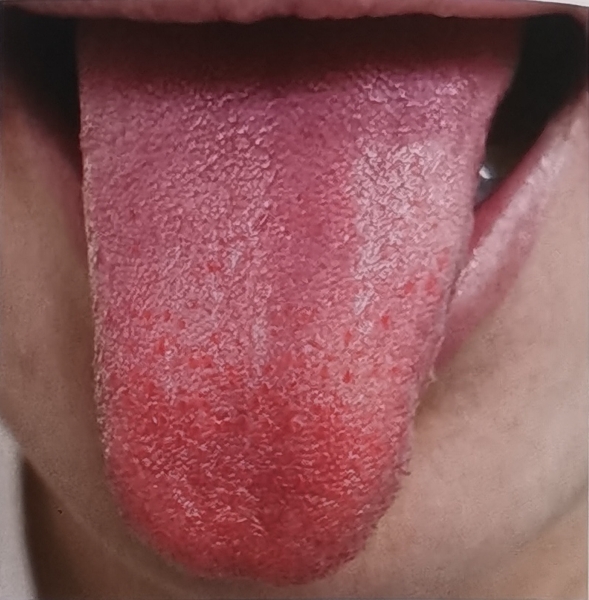
(Image) Bright red tongue with little coating.
2. How to Regulate
This tongue sign indicates Yin deficiency with excessive fire, and treatment should focus on nourishing Yin, clearing heat, benefiting Qi, and calming the spirit. With the guidance of Chinese Tongue Diagnosis, patients can adopt appropriate methods based on changes in their tongue appearance.
- Daily Maintenance: It is advisable to consume cooling, hydrating foods such as seasonal fruits, vegetables, and fungi. Yin-deficient individuals should avoid staying up late to prevent further depletion of Yin fluids. Sufficient sleep is essential for improving the tongue condition.
- Herbal Medicine: To nourish Yin, clear heat, and benefit Qi, you can choose herbs such as American ginseng (西洋参), Scrophularia (玄参), Salvia miltiorrhiza (丹参), Schisandra (五味子), Asparagus root (天冬), Ophiopogon (麦冬), Platycladus seeds (柏子仁), Ziziphus seeds (酸枣仁), and Rehmannia (生地黄). These herbs can effectively nourish Yin, clear heat, and benefit Qi, improving symptoms of excessive fire due to Yin deficiency.
- Acupressure: Points such as Ran Gu (然谷), Shao Hai (少海), Tai Chong (太冲), and Xing Jian (行间) can be massaged to help clear fire, nourish Yin, and tonify the liver and kidneys. Chinese Tongue Diagnosis suggests that when the tongue appears bright red with little coating, combining these acupressure techniques can promote the restoration of Yin fluids and alleviate symptoms of excessive fire. Additionally, Gua Sha (scraping therapy) on the kidney and bladder meridians can strengthen the kidneys, tonify Yang, and promote the balance of Yin and Yang in the body.
四. Cracked Red Tongue – Internal Heat Damaging Yin
According to Chinese Tongue Diagnosis, a cracked red tongue presents with a deep red to purple-red tongue body, with irregular, varying-depth cracks on the surface and little coating. The red-purple color and sparse coating indicate that heat has entered the nutrient and blood levels, causing Yin deficiency and internal heat. The cracks are a manifestation of internal heat damaging bodily fluids, especially when heat has accumulated over time, gradually depleting Yin fluids and resulting in cracks on the tongue surface.
1. Pathological Tongue Signs and Other Symptoms
This tongue sign is typically the result of Yin deficiency with excessive fire and heat damaging Yin. Prolonged internal heat damages the body’s fluids, leading to a dry and cracked tongue. Patients may experience symptoms such as dry mouth, dry tongue, irritability, and heat in the palms and soles. Through Chinese Tongue Diagnosis, the extent of Yin fluid depletion can be accurately assessed, providing direction for treatment.
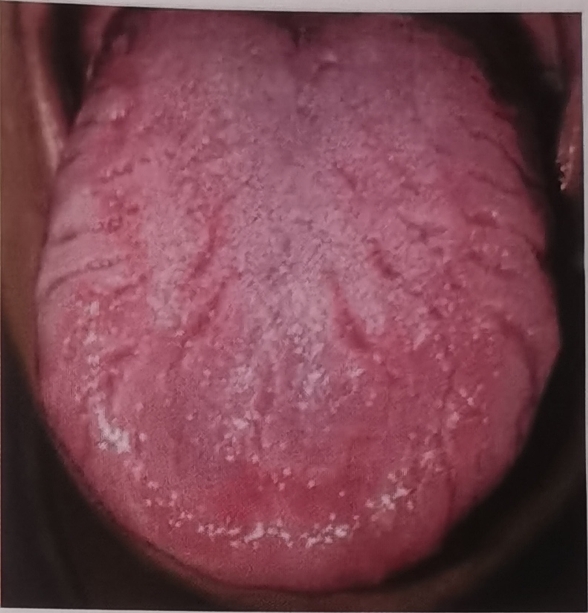
(Image) Tongue body is deep red with cracks.
2.How to Regulate
This tongue sign indicates internal heat damaging Yin, and the treatment should focus on strengthening the spleen, benefiting Qi, nourishing Yin, clearing heat, and moistening dryness. Based on Chinese Tongue Diagnosis, personalized treatment plans can be formulated by monitoring changes in the tongue body and coating.
- Daily Maintenance: It is recommended to consume foods that nourish Yin and generate fluids, such as millet (小米), white fungus (银耳), mulberries (桑葚), pears (梨), lily bulbs (百合), and yam (山药). Avoid hot, spicy foods such as chili (辣椒), ginger (姜), and garlic (蒜), which may worsen internal heat and damage Yin. Yin-deficient individuals should focus on consuming cooling and nourishing foods and maintaining good sleep and eating habits to help restore Yin fluids.
- Herbal Medicine: To treat Yin deficiency with excessive fire, you can use herbs that nourish Yin and clear heat, such as American ginseng (西洋参), Ophiopogon (麦冬), Polygonatum (玉竹), lily bulbs (百合), and Codonopsis (党参). These herbs have the effects of nourishing Yin, benefiting Qi, clearing heat, and moistening dryness, which can effectively relieve the symptoms of internal heat damaging Yin. Classic formulas like Da Bu Yin Wan (大补阴丸) are also commonly used for this condition.
- Acupressure: Points such as Pi Shu (脾俞), Wei Shu (胃俞), Ge Shu (膈俞), Zu San Li (足三里), and San Yin Jiao (三阴交) can be massaged to strengthen the spleen, benefit Qi, and promote blood circulation. Simultaneously, Ran Gu (然谷), Tai Chong (太冲), Xing Jian (行间), and Shao Hai (少海) can be used for gua sha (scraping therapy), which helps nourish Yin, clear heat, and regulate liver and kidney functions, promoting the balance of Yin and Yang in the body.
五. Pale Red Mirror Tongue – Qi and Yin Deficiency
According to Chinese Tongue Diagnosis, a pale red mirror tongue presents with a pale red color and a smooth, relatively dry surface, lacking moisture. This tongue sign is typically a manifestation of Qi and Yin deficiency, indicating that internal heat has accumulated over time, gradually depleting the body’s Qi, blood, and Yin fluids. Qi deficiency leads to a lack of bodily fluids, and Yin deficiency further depletes these fluids, causing the tongue to lose its normal lubrication, resulting in a smooth and dry appearance.
1 .Pathological Tongue Signs and Other Symptoms
This tongue sign is commonly seen in chronic consumption diseases, particularly in cases where physical strength or immunity has been continuously depleted. Patients may experience symptoms such as thirst, fatigue, shortness of breath, low voice, loss of appetite, insomnia, and other symptoms related to Yin deficiency. Chinese Tongue Diagnosis can help identify Qi and Yin deficiency symptoms and provide clear guidance for treatment.
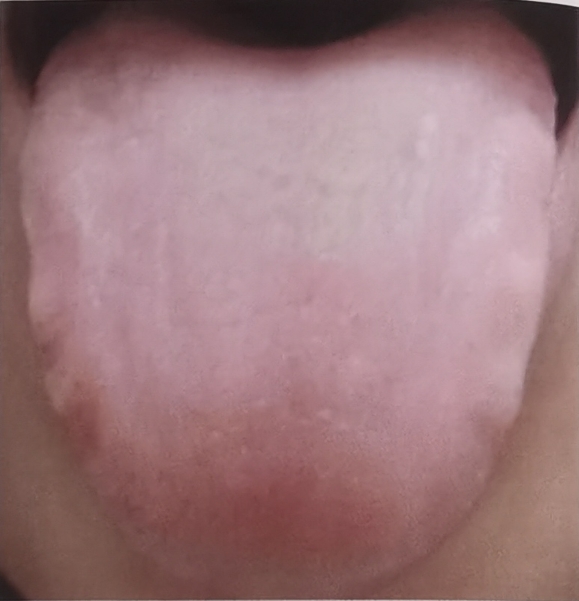
(Image) Tongue coating is sparse, with a smooth tongue surface.
2. How to Regulate
As this tongue sign reflects both Qi and Yin deficiency, the focus of treatment should be on replenishing original Qi and nourishing Yin to generate fluids. By strengthening the production of Qi and blood and moistening Yin fluids, overall body function can be improved.
- Daily Maintenance: It is recommended to eat foods that benefit Qi and nourish Yin, such as grains (杂粮), soy products (豆制品), eggs (蛋奶类), and fish (鱼类). These foods help balance the body’s Qi and blood, promoting Yin nourishment. Oyster tofu soup is a great dietary remedy; when consumed in moderation, it helps nourish Yin and replenish blood, restoring vitality. At the same time, it is advised to reduce the intake of grilled and fried foods (烧烤、煎炸), as these can harm Qi and Yin.
- Herbal Medicine: For Qi and Yin deficiency, Radix Adenophorae (沙参), Ophiopogon (麦冬), Dendrobium (石斛), Polygonatum (玉竹), Schisandra (五味子), and Astragalus (黄芪) are effective herbs. These herbs have the effects of benefiting Qi, nourishing Yin, and generating fluids, helping to restore the body’s Yin fluids and energy. They can alleviate symptoms such as thirst and fatigue caused by Yin deficiency.
- Acupressure: Moxibustion or massage of points such as Fei Shu (肺俞), Pi Shu (脾俞), Tai Yuan (太渊), Chi Ze (尺泽), and Zu San Li (足三里) can help replenish Qi and regulate Qi and Yin. Moxibustion is especially beneficial for Qi and Yin deficiency, as the warming effect promotes the flow of Qi and blood, enhancing the body’s self-healing abilities.
六. Geographical Tongue – Stomach Yin Deficiency
According to Chinese Tongue Diagnosis, a geographical tongue typically presents with a red tongue body, with irregular patches of the tongue coating that have peeled off, resembling the shape of a map. The tongue body is thin, indicating a deficiency of stomach Yin, internal heat, and a lack of fluids in the stomach, which are unable to properly moisturize the tongue’s surface. Geographical tongue is a common manifestation of stomach Yin deficiency.
1. Pathological Tongue Signs and Other Symptoms
This tongue sign is often accompanied by symptoms of internal heat due to Yin deficiency. Patients may experience symptoms such as five-center heat (五心烦热), chest tightness, shortness of breath, fatigue, pale yellow complexion, and dry mouth and throat. Chinese Tongue Diagnosis can clearly identify the symptoms of stomach Yin deficiency and guide appropriate treatment.
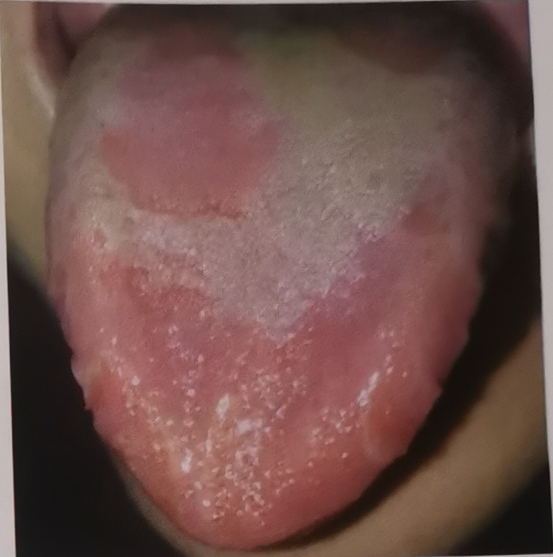
(Image) Tongue body is red, with partial loss of coating.
2. How to Regulate
For patients with stomach Yin deficiency, the treatment should focus on nourishing the stomach, generating fluids, and clearing internal heat. The key is to restore the Yin fluids in the stomach, relieve internal heat, and replenish stomach fluids.
- Daily Maintenance: Maintain a varied and easily digestible diet, avoiding spicy and stimulating foods such as chili (辣椒), onion (葱), garlic (蒜), as well as greasy, fried, moldy, or pickled foods that are hard to digest. Seafood, lamb (羊肉), and chives (韭菜) should also be avoided, as they can aggravate stomach heat. The diet should focus on light and easily digestible foods, which help nourish stomach Yin and restore normal digestive function.
- Herbal Medicine: For stomach Yin deficiency, herbs such as Goji berries (枸杞子), Rehmannia (熟地黄), Shan Zhu Yu (山茱萸), Chinese yam (山药), Ophiopogon (麦冬), Schisandra (五味子), Anemarrhena (知母), and Lily (百合) can be used. These herbs have the effects of clearing heat, cooling the blood, nourishing Yin, and generating fluids. They help restore stomach Yin and alleviate symptoms like dry mouth and throat.
- Acupressure: For regulating stomach Yin deficiency, acupressure or moxibustion at points such as Tian Jing (天井), Jian Shi (间使), Guan Yuan (关元), He Gu (合谷), Zu San Li (足三里), and San Yin Jiao (三阴交) can help balance Qi and blood, nourish Yin, and generate fluids. The ping bu ping xie (平补平泻) method of massage, which alternates between tonifying and reducing techniques, can effectively regulate the symptoms of stomach Yin deficiency and restore the health of the stomach.
七. Cracked Tongue with White, Thick, Greasy Coating – Liver Qi Stagnation and Spleen Deficiency
According to Chinese Tongue Diagnosis, a cracked tongue typically presents with a dark red tongue body, prominent cracks in the middle of the tongue, and teeth marks on both sides, along with a white, thick, and greasy coating. This tongue sign reflects dysfunction in the spleen’s transportation and transformation function, leading to the accumulation of dampness and phlegm, which obstructs the meridians and causes food stagnation. This results in internal heat. If the patient also experiences symptoms such as irritability, insomnia, and vivid dreams, it suggests Liver Qi stagnation, which disrupts the smooth flow of Qi and blood.
1 .Pathological Tongue Signs and Other Symptoms
This tongue sign is commonly seen in Liver Qi stagnation with Spleen deficiency. Patients may experience irritability, insomnia, vivid dreams, heat sensations, indigestion, dry mouth, and dry tongue. Chinese Tongue Diagnosis can identify the characteristic tongue features of cracks and a thick, greasy coating, leading to a diagnosis of Liver Qi stagnation and Spleen deficiency, which guides the appropriate treatment.
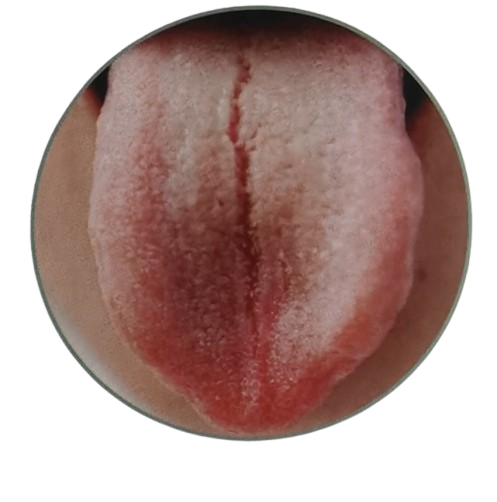
(Image) Tongue has cracks, with white, thick, greasy coating.
2. How to Regulate
For Liver Qi stagnation and Spleen deficiency causing a cracked tongue, the treatment should focus on soothing the Liver, relieving stagnation, and tonifying the Spleen to enhance its function of digestion and transformation, ease the stagnation of Liver Qi, and alleviate symptoms.
- Daily Maintenance: The diet should be light and easy to digest, with foods best cooked, such as beans (豆类) and peanuts (花生米). For patients with Liver Qi stagnation, it is helpful to consume foods that soothe the Liver and relieve stagnation, such as Hawthorn (山楂), which helps to promote the smooth flow of Liver Qi, improve mood, and alleviate irritability.
- Food Therapy: A recipe for food therapy: Citron (香橼) 10g, Buddha’s Hand (佛手) 12g, rice (大米) 60g. Wash the citron and Buddha’s hand, then add an appropriate amount of water to decoct for 2 times, discard the residue, and extract the juice. After washing the rice, cook it with the citron and Buddha’s hand juice to make porridge. This is beneficial for soothing the Liver, relieving stagnation, and transforming phlegm.
- Herbal Medicine: If Spleen deficiency is the main issue, Si Jun Zi Decoction (四君子汤) can be used. If there is dampness, Shen Ling Bai Zhu San (参苓白术汤) is recommended. If the dampness is severe, Ping Wei San combined with Er Chen Tang (二陈汤) should be used. For patients with Spleen Yang deficiency, Fu Zi Li Zhong Tang (附子理中汤) may be helpful. For more severe Liver Qi stagnation, a modified version of Xiao Yao San (逍遥散) can be considered for treatment.
- Acupressure: To treat Liver Qi stagnation and Spleen deficiency, acupressure on points like Spleen Shu (脾俞), Zhong Wan (中脘), Xia Wan (下脘), and Stomach Shu (胃俞) can help tonify the Spleen and stomach, enhancing their digestive and transforming functions. Additionally, moxibustion or acupressure on points such as Neiguan (内关), Qimen (期门), San Yin Jiao (三阴交), and Zu San Li (足三里) can help soothe the Liver, relieve stagnation, improve mood, and alleviate symptoms of Liver Qi stagnation and Spleen deficiency.
八. Cracked Tongue with Yellow, Thick, Greasy Coating – Liver and Kidney Yin Deficiency with Qi Stagnation and Blood Stasis
According to Chinese Tongue Diagnosis, a cracked tongue with a yellow, thick, greasy coating is commonly seen in patients with Liver and Kidney Yin deficiency combined with Qi stagnation and Blood stasis. The tongue body is generally red, with the tip having little or no coating, while the back of the tongue has a yellow, thick, greasy coating. The tongue also displays numerous fine cracks. The red tongue and little coating usually indicate heat entering the nutritive blood (营血) and Yin deficiency with internal heat, while the yellow, thick, greasy coating suggests damp-heat accumulation in the body. The cracks indicate severe internal heat, leading to damage to body fluids.
1 .Pathological Tongue Signs and Other Symptoms
This tongue sign predominantly suggests Liver and Kidney Yin deficiency, with Qi stagnation and Blood stasis. Patients may experience palms and soles heat, dry mouth and throat, a preference for cool foods, constipation, irritability, and insomnia. Through Chinese Tongue Diagnosis, these symptoms can be effectively identified, and the appropriate treatment can be provided.

(Image) Tongue with cracks and a yellow, thick, greasy coating.
2.How to Regulate
For a cracked tongue with Liver and Kidney Yin deficiency and Qi stagnation with Blood stasis, the focus of treatment should be on nourishing Yin, tonifying the Kidneys, and promoting blood circulation to resolve stasis, helping restore Liver and Kidney functions, smooth Qi and blood flow, and eliminate damp-heat.
- Daily Maintenance: It is recommended to consume foods that nourish Liver and Kidney Yin and promote blood circulation to eliminate stasis, such as Chinese yam (山药), black sesame (黑芝麻), mulberries (桑葚), duck meat (鸭肉), and black beans (黑豆). Avoid foods that are spicy and drying such as chili (辣椒), ginger (姜), garlic (蒜), and Sichuan peppercorn (花椒), as they can exacerbate the damp-heat symptoms.
- Herbal Formula: For Liver and Kidney Yin deficiency combined with Qi stagnation and Blood stasis, recommended herbs include Rehmannia (生地黄), Angelica sinensis (当归), Red peony root (赤芍), White peony root (白芍), Peach kernel (桃仁), Safflower (红花), Chuanxiong (川芎), and Bupleurum (柴胡). Common formulas include Xuefu Zhuyu Decoction (血府逐瘀汤) and Liuwei Dihuang Wan (六味地黄丸), which help tonify the Liver and Kidneys, and activate blood circulation to resolve stasis.
- Acupressure: Acupressure on points like Xuehai (血海), San Yin Jiao (三阴交), and Quchi (曲池) can help unblock meridians, tonify Qi, and activate blood circulation. Gua Sha (scraping therapy) can also be performed on points such as Hegu (合谷), Qimen (期门), Ququan (曲泉), and Taichong (太冲) to soothe the Liver, regulate Qi, and clear heat from the Liver, thereby relieving symptoms of Liver and Kidney Yin deficiency.
- Minimize Medication Damage: Long-term medication use can increase the burden on the liver, leading to liver damage, which in turn can cause Yin deficiency and blood stasis. It is recommended to use medications under the guidance of a healthcare professional based on Chinese Tongue Diagnosis and avoid self-prescribing medications to prevent worsening the condition.
九. Thin Red Tongue with Yellow, Greasy Coating – Liver Fire with Stomach Heat
According to Chinese Tongue Diagnosis, a thin red tongue with a yellow, greasy coating often suggests Liver Fire and Stomach Heat. In this case, the tongue body is small and red, indicating internal fire or Yin deficiency with excess heat. The yellow, greasy coating indicates the presence of damp-heat, and a dry tongue surface suggests a lack of Yin fluids, leading to rising fire.
1. Pathological Tongue Signs and Other Symptoms
This tongue appearance suggests that the patient has an excess of Liver Fire and Stomach Heat, and may experience symptoms such as palms and soles heat, night sweats, irritability, insomnia, blurred vision, constipation, and short, dark urine. These symptoms are closely related to the tongue signs and can help identify the cause of the condition, guiding appropriate treatment.
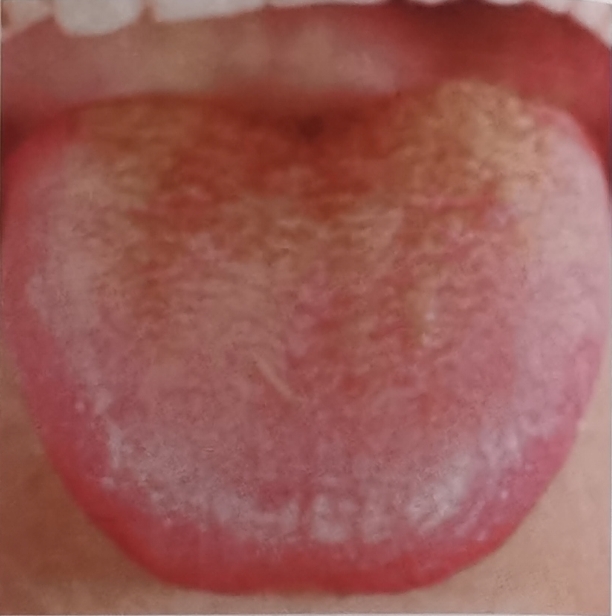
(Image) Tongue is thin and red, with yellow, greasy coating.
2.How to Regulate
For a thin red tongue with Liver Fire and Stomach Heat, treatment should focus on clearing Stomach heat, soothing Liver Qi, and balancing internal Yin and Yang to relieve symptoms.
- Daily Maintenance: Regular consumption of Goji and Chrysanthemum tea (枸杞菊花茶) can help nourish Yin, tonify the Kidneys, nourish the Liver, improve vision, and clear heat, making it suitable for patients with Stomach heat and Liver Fire. Additionally, foods rich in dietary fiber, such as whole grains and vegetables, can help maintain regular bowel movements and clear internal heat.
- Herbal Formula: For symptoms of Liver Fire and Stomach Heat, herbs such as Gentiana (龙胆草), Scutellaria (黄芩), Bupleurum (柴胡), Gardenia (栀子), Alisma (泽泻), Mutong (木通), Plantago (车前子), Angelica (当归), Dandelion (蒲公英), and Chrysanthemum (菊花) are recommended. These herbs can help clear heat, soothe the Liver, promote Qi circulation, and drain dampness. Over-the-counter formulas like Longdan Xiegan Wan (龙胆泻肝丸) are commonly used for these symptoms.
- Acupressure: During treatment, moxibustion or acupressure on points like Zhongwan (中脘), Xiawan (下脘) can help clear Stomach heat and soothe Liver Qi. Additionally, massaging points like Hegu (合谷), Quchi (曲池), Neiting (内庭), and Xingjian (行间) can help clear Stomach fire and relieve symptoms of Liver and Stomach disharmony.
十. Dark Red Tongue with Stagnation Spots and Thin Coating – Yin Deficiency with Internal Heat and Blood Stagnation
According to Chinese Tongue Diagnosis, a dark red tongue with stagnation spots and a thin coating typically suggests Yin deficiency with internal heat and blood stagnation. A deep red tongue (crimson tongue) indicates heat entering the nutritive and blood levels, showing excessive internal heat that damages Yin and consumes Qi. Stagnation spots on the edges and tip of the tongue suggest blood stasis, often accompanied by Lung heat.
1 .Pathological Tongue Signs and Other Symptoms
This tongue appearance suggests the patient has phlegm obstructing the blood, Lung and Kidney Yin deficiency, and excessive internal fire. The patient may experience symptoms such as bitter taste in the mouth, dry mouth, constipation, short, dark urine, frequent vivid dreams, insomnia, forgetfulness, tinnitus, and dizziness. These symptoms align with the tongue signs and can assist in identifying the internal imbalance, guiding appropriate treatment.
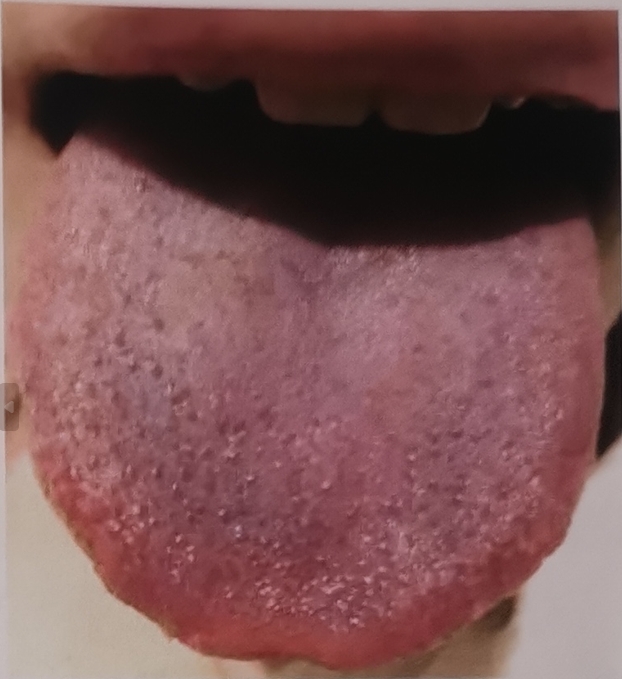
(Image) Deep red tongue with stagnation spots on the edges and tip.
2.How to Regulate
Since the formation of the deep red tongue with stagnation spots and thin coating is primarily due to Yin deficiency with internal heat, phlegm obstructing blood, and blood stagnation, treatment should focus on clearing heat, nourishing the lungs, and activating blood circulation to restore balance between Yin and Yang.
People with Yin deficiency and internal heat should engage in activities like walking or slow jogging.
- Daily Maintenance: Patients with Yin deficiency and internal heat can engage in moderate daily exercise, such as walking or slow jogging for 30 minutes, to enhance their physical health and promote blood circulation. In terms of diet, it is recommended to avoid spicy, stimulating, and greasy foods. Instead, opt for cooling and fluid-generating foods like pears (梨), watermelon (西瓜), loofah (丝瓜), water chestnuts (荸荠), lotus root (莲藕), and duck (鸭肉) to help clear the internal heat.
Herbal formula: Always follow the doctor’s instructions when using medications.
- Herbal Formula: Herbs that nourish Yin, moisturize the lungs, and tonify the kidneys are recommended, such as Tremella (银耳), Rehmannia (生地黄), Yuzhu (玉竹), Ophiopogon (麦冬), Bird’s Nest (燕窝), Adenophora (沙参), and Dendrobium (石斛). These herbs help nourish Yin, moisten dryness, and alleviate internal heat. Common commercial formulas include Qi Ju Di Huang Wan (杞菊地黄丸) and Tian Wang Bu Xin Dan (天王补心丹), which help nourish Yin, clear heat, and improve symptoms.
Acupressure on Taixi point (太溪穴).
- Acupressure: During the treatment process, massaging the Taixi (太溪), Sanyinjiao (三阴交), and Zhaohai (照海) points can help nourish Yin and replenish fluids, promoting the balance of Yin and Yang. Additionally, using Xuehai (血海) and Zusanli (足三里) for gua sha (scraping therapy) can activate blood circulation, remove stasis, and relieve symptoms.
十一. Red Tongue with Rough Coating – Spleen and Kidney Yin Deficiency
According to Chinese Tongue Diagnosis, a red tongue with rough coating, cracks, and teeth marks usually indicates Spleen and Kidney Yin deficiency. The red tongue suggests excessive internal heat, while the rough and dry coating indicates insufficient Yin fluid. Prolonged Yin deficiency can cause the tongue coating to lose moisture and develop cracks. Teeth marks on the sides of the tongue suggest Spleen deficiency, which impairs the normal transformation and transportation of fluids.
1. Pathological Tongue Signs and Other Symptoms
Patients with Spleen and Kidney Yin deficiency often exhibit the following symptoms: fatigue, dry mouth and throat, irritability, insomnia, dizziness, tinnitus, afternoon heat, night sweats, and lower back soreness. These symptoms align with the tongue signs and can be used as supplementary diagnostic criteria for Spleen and Kidney Yin deficiency.
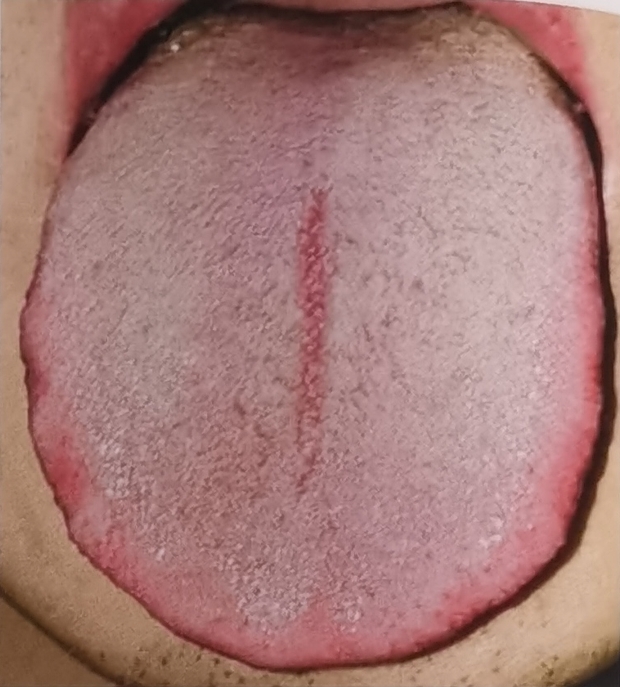
(Image) Red tongue with rough coating, cracks in the middle of the tongue.
2.How to Regulate
The treatment for Spleen and Kidney Yin deficiency should focus on strengthening the Spleen, tonifying the Kidneys, and clearing heat while transforming dampness. Specific measures include adjusting the diet, using appropriate herbal formulas, and performing acupressure to restore Yin fluids, promote smooth circulation, and alleviate symptoms.
Listening to light music can help relieve stress.
- Daily Maintenance: Patients with Spleen and Kidney Yin deficiency should focus on relaxing the mind and avoiding excessive fatigue. It is recommended to practice activities such as listening to light music, calligraphy, or painting to nurture the spirit. For diet, it is beneficial to consume foods that nourish Kidney Yin, such as black sesame (黑芝麻), mung beans (绿豆), lily bulb (百合), mulberries (桑葚), goji berries (枸杞), and Tremella (银耳). These foods help nourish the Spleen and Kidneys, alleviating Yin deficiency symptoms.
Hemp seeds (火麻仁) can help moisten dryness, relieve constipation, and tonify deficiency.
- Herbal Formula: Herbs that strengthen the Spleen, tonify the Kidneys, clear heat, and nourish Yin are recommended, including Hemp seeds (火麻仁), Chinese yam (山药), Yuzhu (玉竹), prepared Rehmannia (熟地黄), Adenophora (沙参), Ophiopogon (麦冬), Licorice (甘草), Jujube (大枣), Peony root (牡丹皮), Alisma (泽泻), Poria (茯苓), and Cornus (山茱英). Commercial formulas such as Liu Wei Di Huang Wan (六味地黄丸) and Zuo Gui Wan (左归丸) are commonly used to tonify Yin, strengthen the Kidneys, and regulate Spleen and Kidney Yin deficiency.
Gua sha on Zusanli (足三里) acupoint.
- Acupressure: For enhancing Spleen and Stomach function, acupressure on the Shenshu (肾俞), Pishu (脾俞), and Ganshu (肝俞) points is recommended. These points help tonify the Kidneys, strengthen the Spleen, and benefit the Liver and eyesight. Additionally, gua sha on Zusanli (足三里), Qihai (气海俞), Sanyinjiao (三阴交), and Yinlingquan (阴陵泉) points can assist in strengthening the Spleen, enhancing blood circulation, tonifying the Kidneys, and improving sleep.
十二. Mirror Tongue with Fine Cracks – Stomach Yin Deficiency
Mirror Tongue refers to a red tongue, smooth surface with little coating, and fine cracks in the middle part of the tongue. The tongue body is thin and slightly red, which typically indicates Stomach Yin deficiency. The red tongue and thinness are signs of deficiency heat, while the presence of cracks suggests excessive internal heat that has damaged Yin fluids. Stomach Yin deficiency is often caused by prolonged internal heat that depletes the Stomach’s Yin, leading to insufficient Yin fluids and subsequently impairing the Stomach’s ability to generate fluids and perform digestion.
1. Pathological Tongue Signs and Other Symptoms
Patients with Stomach Yin deficiency often present with the following symptoms: epigastric dull or burning pain, lack of appetite, dry mouth and throat, irritability, insomnia, dry stools, and heat sensation in the palms and soles. These symptoms match the tongue diagnosis and can serve as supporting indicators for Stomach Yin deficiency.
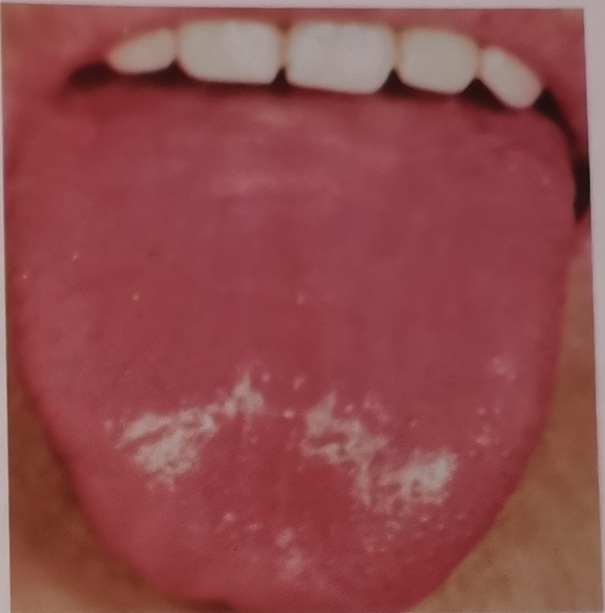
(Image) Red tongue with smooth surface and fine cracks.
2.How to Regulate
The formation of mirror tongue is primarily associated with Stomach Yin deficiency and internal heat. Therefore, the focus of treatment should be on nourishing Yin, clearing heat, and benefiting the Stomach to generate fluids. Below are some specific methods for regulation:
Milk can nourish Yin and moisten dryness.
- Daily Maintenance: For patients with Stomach Yin deficiency, it is advisable to consume foods that nourish the Stomach Yin, such as milk, eggs, Tremella (银耳), pear, and apple. These foods help moisturize dryness and generate fluids to relieve Stomach Yin deficiency. It is best to avoid foods that are warming and hot in nature, such as lamb, walnuts, and shrimp, as they can exacerbate internal heat and further damage Yin.
Yuzhu (玉竹) has nourishing Yin and moistening properties.
- Herbal Formula: Herbs that are sweet and cool, nourishing Yin, and benefiting the Stomach are recommended, such as Rehmannia (生地黄), Ophiopogon (麦冬), Adenophora (沙参), and Yuzhu (玉竹). These herbs help nourish Yin and tonify the Stomach, alleviating the discomfort caused by Stomach Yin deficiency. Commercial formulas such as Yigui Decoction (益胃汤) and Yin Deficiency Stomach Pain Formula (阴虚胃痛冲剂) are commonly used for regulating this condition.
Cupping on Taixi (太溪) acupoint.
- Acupressure: To restore Stomach Yin, acupressure on the Zhongwan (中脘), Zusanli (足三里), and Neiguan (内关) acupoints can help stimulate the Stomach Qi and improve its function. Additionally, cupping on the Taixi (太溪) and Sanyinjiao (三阴交) acupoints can help clear heat, tonify Qi, strengthen the Spleen, and restore Stomach Yin, thus alleviating the symptoms associated with Stomach Yin deficiency.
Summary
Through Traditional Chinese Medicine (TCM) tongue diagnosis, we can effectively understand the body’s health status, especially the manifestations of Yin deficiency. Changes in the tongue’s appearance, such as deep red, cracks, and little coating, often indicate excessive internal heat due to Yin deficiency, meaning the body lacks Yin fluids and is experiencing excessive internal heat.
For such symptoms, TCM recommends methods like nourishing Yin, clearing heat, and benefiting the Stomach to generate fluids, to restore the balance of Yin fluids and alleviate discomfort caused by Stomach Yin deficiency. With appropriate dietary adjustments, herbal formulas, and acupressure, guided by tongue diagnosis, patients can effectively improve their constitution, balance Yin deficiency, and restore overall health.
This holistic approach helps in nourishing Yin, regulating internal heat, and enhancing digestive function for better well-being.
More Articles in “Tongue Physique”
- Tongue Image Body Type
- Qi Deficiency Body Type
- Qi Stagnation Body Type
- Damp-Heat Body Type
- Phlegm Dampness Body Type
- Blood Stasis Body Type
- Yang Deficiency Body Type
- Yin Deficiency Body Type




